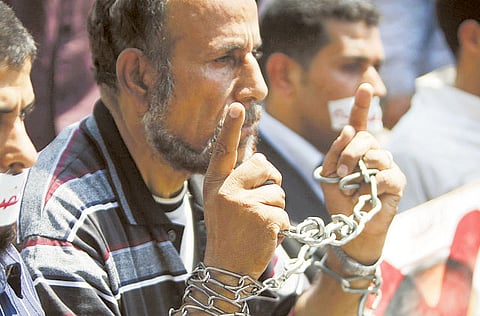Egyptians vote amid confusion, disappointment
Islamists lick wounds on eve of presidential vote

Cairo: Stung by a court ruling dissolving their five-month-old parliament, Egypt’s Islamists are throwing their weight behind Mohammad Mursi, the Muslim Brotherhood’s presidential candidate. Mursi is fighting in the Saturday-Sunday runoffs against Ahmad Shafiq, the last premier in the deposed regime of Hosni Mubarak.
Egypt’s highest court on Thursday also ruled that Shafiq is legal to stand after declaring as unconstitutional a law barring Mubarak-era officials from running for public office.
“The 51 million Egyptians who have the right to vote will protest (keeping Shafiq in the race) at the ballot box,” said Essam Al Erian, a Brotherhood official and a lawmaker in the disbanded legislature. “I’m sure the Egyptians will support the candidate of the revolution whom Mubarak detained at the climax of the revolution,” he told Gulf News.
The Brotherhood, who controlled nearly half of the seats in the parliament, portrays Mursi, a conservative Islamist, as a symbol of the popular revolt that toppled Mubarak in February last year.
However, Shafiq, an ex-army general, has accused on several occasions this group, banned and oppressed under Mubarak, of seeking to establish a theology in Egypt and pursuing discrimination against the Christian minority.
Following an emergency meeting late Thursday on the rulings given by the Supreme Constitutional Court, the Brotherhood said it respects the verdicts. “The ruling means that the Exclusion Law (the ban on Mubarak-era official) is flawed,” said the group’s secretary general Mahmoud Hussain. “But it does not mean the people will vote for Shafiq. On the contrary, they will exclude him from the political life through the ballot box.” He said that his group does not plan mass protests against the court decisions.
Salafists or ultra-conservative Muslims, who held 26 per cent of the parliamentary seats, were quick to voice anger at the rulings and renew support for Mursi.
“These (court) decisions have disappointed the Egyptians who elected the parliament, which was the first since the revolution,” said Ahmad Khalil, an MP for the Salafist Nour Party. “I expect laws hostile to the revolution to be passed in the absence of the parliament. Now it is the duty of all Egyptians to prevent this by voting for Dr Mursi.”
Likewise, the Jamaa Islami (an ultra-conservative Islamist group) yesteriday urged Egyptians to vote en masse for Mursi “to ensure he will score a landslide that will abort any attempt for vote fraud”.
“Everyone should use peaceful ways to stop attempts to hijack the revolution and avoid violence that can thrust the country into a dark tunnel,” added the group in a statement.
Shafiq’s opponents see him as a Mubarak’s loyalist and will revive oppressive methods of the former regime if he becomes president.
The military generals, who have been governing Egypt since Mubarak’s ouster, will have the legislative power until a new parliament is elected. No date has been set for the polls, according to legal experts.
The military previously pledged to hand over power to an elected civilian administration by the end of June, which seems unlikely now, they said.
“The Muslim Brotherhood is to blame for all of this,” said MP Khaled Shaaban from the liberal Egyptian Party. “The group was obsessed with monopolising the political scene in Egypt,” he added.
A rise of Islamists in post-Mubarak Egypt has triggered fears among Christians and secularists about possible curbs on freedoms.



